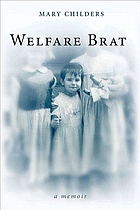I read a lot of autobiographies, but seldom does it occur to me to consider what a feat of memory and bravery it is to get down a rich portrait of one's life. Mary Childers does an admirable job of recalling her impoverished childhood and adolescence in the Bronx, and is pretty out there about what she endured, including her own shaming behaviors. I wonder if her telling the story in the present tense helped her with that? It kind of confused me, so I wish that even if the device helped her memory, that she'd switched it to past tense after the first draft.
I appreciated that Childers, even growing up living as close to the bone as she did,
In some households, "Where do presents come from? is a more perplexing question than "Where do babies come from?" p.93
she still recognized the few privileges her white skin gave her,
It's true that we have a few more options because we're white. If landlords see Mom and one or two of us, maybe we can escape to a block that is still populated by some white people and employed minorities. ... I've stopped telling any of the black and Puerto Rican kids in my building about my jobs, because they'd never get hired. You have to talk white to be in sales. White skin, it seems, opened doors I thought I had elbowed my way through solely with gumption and random luck. p.202
I get so annoyed with those Marxist-Leninist, or really all "no war but class war" types that refuse to acknowledge race privilege. Race doesn't play that huge a role in this book, but it's not unimportant either, Childers having grown up in New York City and all and often existing as a "minority" in neighborhoods and schools that are largely populated by African-Americans and Latin@s.
To me the strength of the book is getting a glimpse of what that life is really like. Poor children don't grow up to write books nearly as often as middle class and rich ones, I imagine. And it's always interesting to read about people growing up in NYC's recent past.
He had always been a cruel and violent drunk, but when he dangled Lacey out of a window because she wasn't his kid, Mom ditched him. At least that's what she tells us. I'm glad to have a standard for where to draw the line on the kind of abuse to take from men. p.17
I wish my social studies teacher would verify what the old Irish guy told me and Paula about these crowded hills belonging to the Appalachian Mountains. But during the geography unit we only memorized and pierced with pushpins the map locations of natural resources and capitals in Africa, Asia and Central and South America, as if preparing for lifetimes of exile or plunder. p.127

Comments
Barbara (not verified)
Fri, 08/21/2009 - 2:10pm
Permalink
This sounds really good.
This sounds really good. (And thanks for the present tense warning; that always takes getting used to for me.) I'll have to look it up.
Laura-Marie (not verified)
Fri, 08/28/2009 - 11:46pm
Permalink
So much geography really is
So much geography really is taught that way!